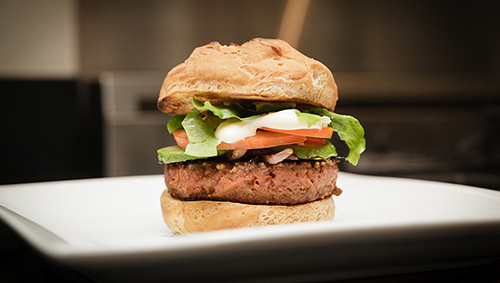英語記事に慣れる「サクっと読む英文」
2017.9.26
Meatless burger that ‘bleeds’ launches in US
Read the article to learn why eating less red meat is good for the planet.
なぜ牛肉の消費量を減らすことが地球にとって良いことなのか、記事を読んでみましょう。

Many other plant-protein burgers have been on the market for years, but most of these look and taste very different from meat and are marketed to people who don’t eat meat. Beyond Meat is doing things a little differently, and worked for more than seven years to create their pea-protein patty to make meat eaters think they’re eating a regular hamburger.
Instead of focusing on people who don’t eat meat, Beyond Meat wants to market their burger to meat eaters. The company aims to replace animal protein diets with plant protein diets. To do this, the California company knows they’ve got to give meat eaters what they love – a juicy burger.
So far, food critics are giving Beyond Burger a thumbs up, saying the burgers look, feel, and taste just like the real thing. The burger even “bleeds” – that is, the beet juice that gives the patty its pink center makes it look just like a rare hamburger.
Beyond Meat launched their product last year in Whole Foods, a popular natural foods supermarket chain in the US. This summer, the company brought their burgers to a number of other businesses, including Alamo Drafthouse, a popular dine-and-watch cinema chain, and Chicago burger chain Epic Burger.
Beyond Burger isn’t exactly a healthier alternative to meat. The patty still has about the same amount of calories and fat as a regular hamburger – and quite a bit more sodium. But it is better for our planet. The beef industry is one of the biggest causes of global warming. Plant-based diets are better for the Earth, and as Professor Tim Benton of the University of Leeds told The Guardian in 2014: “The biggest intervention people could make towards reducing their carbon footprints would not be to abandon cars, but to eat significantly less red meat.” Perhaps Beyond Burger is a step in this direction.
A Californian company has brought us a new type of juicy burger, and one that is better for the Earth. Beyond Meat created a meatless burger that looks and tastes like a regular hamburger. “Beyond Burger” is in the meat section of the biggest US supermarket company, Kroger, starting from June of this year.
Many other meatless burgers have been on the market for years, but most of these look and taste very different from meat. Most meatless burgers are marketed to people who don’t eat meat. Beyond Meat is doing things a little differently. The company worked for more than seven years to make their meatless patty, so even meat eaters think they’re eating a regular hamburger.
Beyond Meat wants to bring their burger to meat eaters. The company aims to get people to stop eating meat, and eat more plant-based diets. To do this, the California company knows they’ve got to give meat eaters what they love – a juicy burger.
So far, food critics are saying the Beyond Burger looks, feels, and tastes just like a regular hamburger. The burger even “bleeds” – that is, beet juice gives the patty a pink center and makes it look just like a rare hamburger.
Beyond Meat introduced their product last year in Whole Foods, a popular natural foods supermarket company in the US. This summer, other businesses started selling Beyond Burgers. Alamo Drafthouse, a popular dine-and-watch cinema company, and Chicago burger company Epic Burger both serve the meatless burgers.
Beyond Burger isn’t really healthier than real meat. The patty still has about the same amount of calories and fat as a regular hamburger. The burger also has quite a bit more salt. But it is better for our planet.
The beef industry is one of the biggest causes of global warming. Growing plants is better for the Earth than raising cows. In 2014, Professor Tim Benton of the University of Leeds told The Guardian that the biggest thing people could do to stop global warming is to eat a lot less red meat. Perhaps Beyond Burger is a way to do that.
キーフレーズ
make one’s way into ~ ~に進出する
plant-protein 植物性たんぱく質
market 売り出す、売り込む
広告などの努力をして売り込む、市場に出すという意味です。
例:We’re going to try to market this product to new mothers.
(私たちはこの商品を新米ママたちに向けて売り出す予定です。)
pea-protein ピープロテイン(エンドウ豆由来プロテイン)
diet 食生活
have got to ~ ~しなければならない
“have to ~” と同じように義務や必要性を表し、~をしなければいけない、という意味です。
例:I have got to pass my exams in order to get into a good university.
(良い大学に入学するためには試験に合格しなければならない。)
▼こちらもCheck!
“must” と “have to” の違いって?
give ~ a thumbs up ~にOKを出す、~を承認する
親指を立てるジェスチャーを表し、良いと認める、賛成する、という意味の表現です。
例:He gave us the thumbs up to start on the project.
(彼は私たちにプロジェクト開始の承認を出した。)
sodium ナトリウム
plant-based diet 植物性の食品を食べる食生活、菜食
intervention 介入
物事の流れや方向、または結果を変えるために間に入ること、関わることを意味します。
例:Many people want government intervention to help save education programs.
(多くの人が、教育プログラムの救済を支援するための政府の介入を望んでいる。)
abandon 諦める、捨て去る
希望や習慣などを諦める、風習などを捨て去る、という意味です。
例:I abandoned the hope of being able to go to Paris this year.
(今年パリへ行くという望みは捨てた。)


 【Gabaからのお知らせ】
【Gabaからのお知らせ】 【特集】
【特集】 【英単語の正しい使い分け】
【英単語の正しい使い分け】 【使いこなす句動詞】
【使いこなす句動詞】